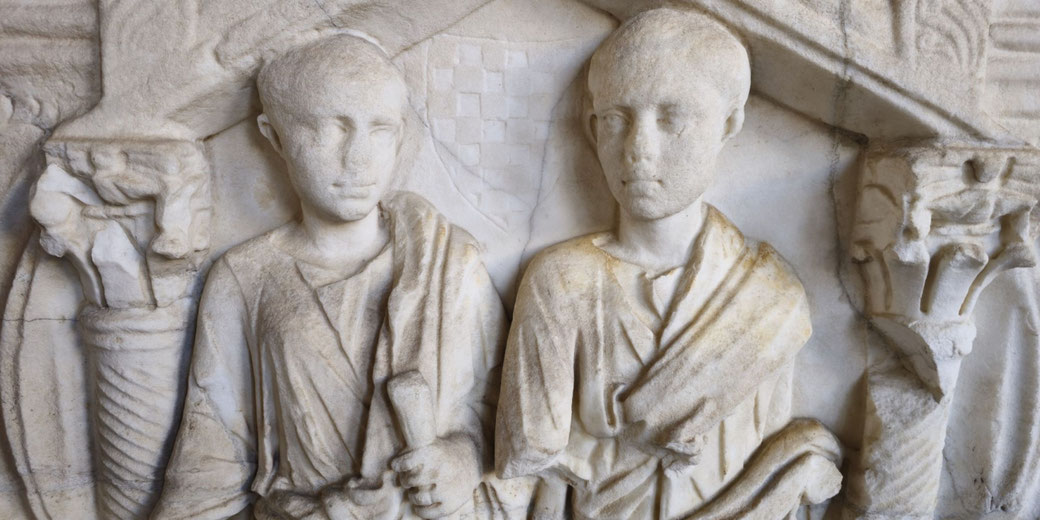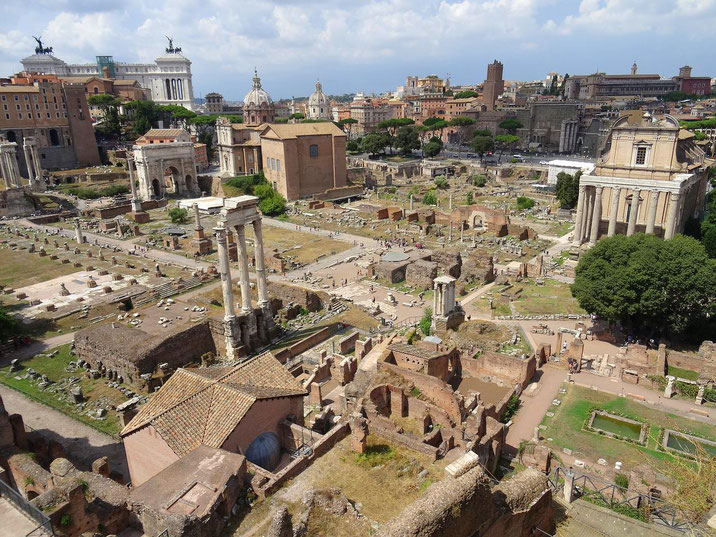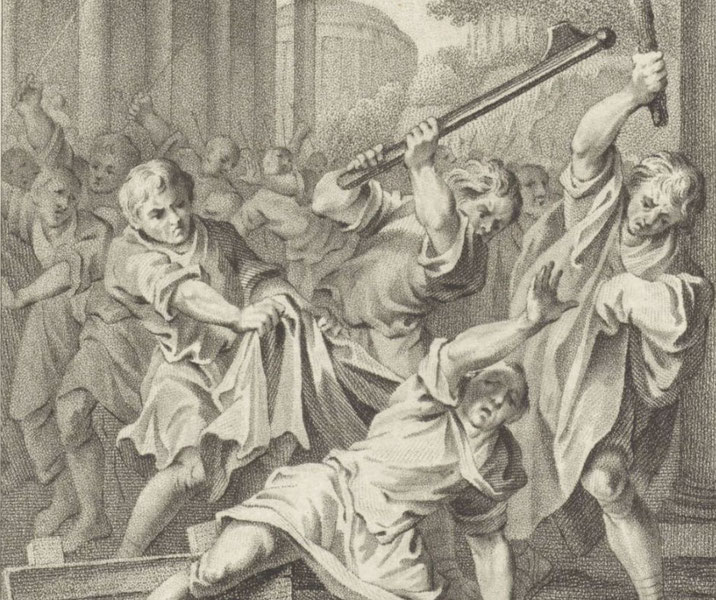How Tiberius and Gaius Gracchus revolutionised Roman politics - and were killed for it

Tiberius and Gaius Gracchus were two brothers who changed the course of Roman history.
Their lives were cut short by violence, but their legacy had a profound impact on late Roman republican politics.
Tiberius and Gaius Gracchus both held the position of Tribune of the Plebs during the second century BC and had attempted to bring land reform, as well as other populist measures, into ancient Rome.
Roman society after the Punic Wars
Following the fall of Carthage at the end of the Third Punic War in 146 BC, Rome had become the most dominant power in the Mediterranean world.
It now possessed territories from Spain in the west to Asia Minor in the east. Rome’s expansion had also made many of its leading citizens wealthier and more powerful than they had ever been before.
However, the centuries of constant warfare also created problems in Roman society, particularly among the poorer classes.
While the upper-class nobles had become very wealthy, the lower class was struggling to make ends meet.
This led to significant social unrest. In the Senate, two great factions, which disagreed on where the political power ultimately rested in Roman society, developed among the senators.
The populares and the optimates
The first faction was known as the populares. The populares were senators who believed that they represented the interests of the common people.
As a result, they sought the support of the Roman people during elections and important political moments during the year.
The populares were often accused to supporting what was 'popular' among the people rather than what was 'best' for the people.
This is where the name populares derives from.
On the other side of the political divide were the optimates. The optimates were senators who believed they were representing what was 'best', for the Roman republic, regardless of whether it was popular or not.
In reality, the optimates often supported the needs of the wealthy elites, which is what the term 'optimates' means (the 'best men', i.e. the wealthy nobles).
During the second half of the 2nd century BC, Roman politicians tended to favour one of these two groups, and their political decisions indicated whether they were optimates or populares.

The land crisis
A particular problem had arisen at this time caused by how the traditional Roman military recruitment system worked.
Since the birth of the Roman republic nearly 400 years before, the soldiers of Rome’s armies were made up of Roman citizens.
Each citizen was responsible for paying for their own weapons and armour. This was only possible if they owned land, on which they could farm and earn money.
These citizen soldiers were then expected to be on military campaign during the year and then only return to their farms and families once a particular war had finished.
This meant that such men could be away for years at a time.
Unfortunately, the absence of these men from their farms often meant that the families left behind struggled to supply the manual labour required to grow enough crops to pay their debts.
Over time, many families were forced to sell their farms, which were often bought up by wealthier nobles who had not gone to war.
Then, when the soldiers returned home from war, they neither had their farms nor an income to feed themselves or their families.
Many of these poorer people were forced to move to the city of Rome, where they hoped to find work.
Over time, the number of unemployed poor families had grown, and they had started approaching senators to create laws to help them get back on their feet again.
Mostly, these people wanted their farms back. Many believed that the Roman government owed them this much since these men had been fighting and dying for Rome during the brutal Punic Wars.
However, the Senate was reluctant to change the situation because many of the senators were the same nobles who had purchased the farms from the poorer families in the first place.
These wealthy elites, who were often part of the equites social group, were earning huge profits from these lands, as they had combined them into huge agricultural plantations called latifundia.
Furthermore, these nobles had no interest in offering the poorest Roman citizens paid work on these farms, as that would require the nobles to pay them wages, which would have been expensive.
Instead, the equites had purchased thousands of foreign slaves to do all of the necessary manual labour, which was far cheaper than hiring Romans as employees.
Tiberius Gracchus
Into this turbulent period stepped the young Tiberius Sempronius Gracchus. Tiberius was born around 168 BC, a grandson of Scipio Africanus and brother-in-law of Scipio Aemilianus.
Tiberius had fought in the Third Punic War during the siege of Carthage. In 137 BC, he was travelling north on his way to Spain.
While passing through Etruria, he claims to have been shocked at how many Roman farms were being run by foreign slaves rather than by Roman citizen farmers.
So, he sought and won election to the office of Tribune of the Plebs for the year 133 BC.
As a tribune, Tiberius proposed a series of reforms that would help the lower class get some of their land back and, by extension, fix the army recruitment crisis.
Specifically, Tiberius wanted to enact agrarian reform. Tiberius' plan limited each citizen to 500 iugera (which was a unit of measurement) of state-owned land (ager publicus), which had been taken during the various wars the Roman state had fought over the last few centuries.
Any extra property would then be seized by the government and given to the poor and homeless in tiny plots of 30 iugera each.
By redistributing wealth in this way, Tiberius also hoped to increase the number of farmers eligible for military service.
Since each soldier was required to fund his own equipment, this would have been a significant financial burden lifted from the poor.

Tiberius' law, known as the Lex Sempronia Agraria, was opposed by the Senate, which was largely composed of senators who owned the majority of the land and it was their source of income.
As a result, Tiberius was detested among Rome's aristocracy.
Tiberius' main adversary was Marcus Octavius, a tribune who used his power of veto to block Tiberius' bills from being passed into the Assembly.
To nullify his fellow tribune's power, Tiberius encouraged the Assembly to vote Octavius out of office, arguing that he no longer represented the 'interests of the people'.
Once Octavius was removed, Tiberius' law was passed.
Tiberius then established a board of three commissioners to oversee the implementation of his law.
The three men chose were Tiberius himself, his brother Gaius, and his father-in-law Appius Claudius Pulcher.
Unfortunately, Tiberius needed the Senate's approval in order to have the necessary money to fund his project.
However, the senators only allowed a token amount available, which effectively meant that the commission could never implement the law.
Tiberius' land reform was effectively at an end unless he could find a sudden influx of cash.
By sheer chance, that is just what happened.
Death of King Attalus III of Pergamon
Then, later in 133 BC, King Attalus III of Pergamon died without an heir. In Attalus' will, he decided that his kingdom, and his wealth, should be handed over to Rome.
At the time that Tiberius was struggling to get his proposal funded by the Senate, this eventuality became a chance for him to circumvent the traditional approval process.
When the funds arrived in Rome from Pergamon, Tiberius saw this as an opportunity to use this sudden influx of wealth from Pergamum to fund his agrarian law.
He realised that he didn't have to rely upon money from the Senate: he just needed the people of Rome to agree to use this new money to redistribute land.
To do this, he just had to get the People's Assembly to vote on his idea rather than the Senate.
However, the Senate saw this as a direct challenge to their power. As Tiberiu's one-year term as tribune was coming to an end, the Senate tried to delay his project so that he would be out of office before it could happen.
Death of Tiberius Gracchus
Knowing that he did not have enough time to enforce his proposal, Tiberius put himself forward to be elected for tribune again, for a second term for 132 BC.
However, no-one in the history of Rome had ever held a magistracy for two consecutive years.
The Senate considered this unprecedented move as clear evidence that Tiberius was trying to become a king, or a tyrant, over Rome itself.
One of the senators that was most concerned about Tiberius' claims to power was his own cousin: Publius Cornelius Scipio Nasica Serapio.
He was an ex-consul, so demanded a lot of political respect, but he was also the leader of the pontifices, one of the most important groups of Roman priests.
Scipio Nasica called on his fellow senators to rise up against Tiberius in order to save Rome from having another king.
On the day of voting, a fight broke out in the Senate between Tiberius' supporters and other senators.
Tiberius was beaten to death with anything his attackers could find nearby, including legs from wooden chairs.
In addition, around 300 of Tiberius' supporters were also killed. Tiberius' attempt at land reform had failed and the social tensions in Roman society continued.
The assassination of Tiberius set a dangerous precedent in Roman political history.
This was the first time that people had stopped the orderly process of political election by resorting to violence and murder.
While it was unspeakably shocking that this had occurred, other people soon became convinced that under the right circumstances, murdering your opponents could be acceptable.
It didn't take long for violence and murder to become a regular part of Roman politics.
Gaius Gracchus
Tiberius' younger brother, Gaius Sempronius Gracchus, was born in 153 BC. Just like his older brother, he became a Tribune of the Plebs for the year 123 BC.
But, unlike Tiberius, who only served one term, Gaius was elected tribune twice. Clearly, things had changed over the ten years since Tiberius' attempt to hold an office for two years in a row, and it was no longer considered to be a concern.
Once elected, Gaius continued his brother's policies and proposed similar land reforms.
He also tried to help the lower class, but he went about it in a different way. He proposed a series of welfare programs that would provide food for the poor.
He also passed a law (Lex Frumentaria) that provided cheap grain for all citizens of Rome to be purchased at a fixed price every month.
Known as the 'grain dole', it was the first time in history that a state had sought to provide a guaranteed food supplement to its people.
He renewed Tiberius' land legislation and established new colonies in Italy and Carthage.
He created a law mandating that Roman males under the age of 17 would not be conscripted, and that the state would pay for minimal military equipment.
Gaius' programs proved to be very popular with the people, but they made him enemies in the Senate.
Like his brother, the senators saw him as a threat to their power. When Gaius won the tribuneship for a second consecutive year for 122 BC, something that Tiberius was killed for trying, many senators raised similar concerns about Gaius' real intentions.
Death of Gaius Gracchus
In 121 BC, Gaius' bill proposing land reform was defeated in the Senate. Furious, Gaius took his supporters and left Rome for Mount Aventine.
From there, he vowed never to return until his bill was passed.
However, the Senate was not going to give in to Gaius' demands. He was accused of becoming a tyrant and was accused of illegally taking state land for his own personal use.
Gaius denied all these charges, but he knew that he would not be able to get a fair trial in the Senate.
After a riot erupted on the Capitoline Hill, one of Gaius' rivals was murdered, and the Senate passed the 'utlimate decree of the Senate' (senatus consultum ultimum) for the first time in history.
This legislation gave the Senate power to designate anyone an enemy of the state and put him to death without a proper trial.
A mob was subsequently gathered to hunt down Gaius.
The Senate sent this group to the Aventine Hill to force him and his supporters back into the city.
When they arrived, a fight broke out, and Gaius knew that he would not get out of this situation with his life.
So, instead of waiting to be tried and executed, Gaius committed suicide.
He ordered his slaves to kill him, and his body was thrown into the Tiber River.
Following Gaius' death, all of his policies were reversed, with the exception of his grain dole for the citizens of Rome.
3,000 of his supporters were subsequently imprisoned and executed as a result of the reprisals that followed.
How Rome changed after the Gracchi
After the deaths of Tiberius and Gaius Gracchus, Rome descended into a period of turmoil and violence.
Their deaths set a precedent of election campaigns ending in bloodshed. Rome would never be the same.
The Gracchus brothers were two of the most influential and controversial figures in Roman history.
Their reforms changed Rome forever, but their methods made them enemies of the Senate.
In the end, their pursuit of power led to their demise.
Further reading
What do you need help with?
Download ready-to-use digital learning resources
Copyright © History Skills 2014-2025.
Contact via email
With the exception of links to external sites, some historical sources and extracts from specific publications, all content on this website is copyrighted by History Skills. This content may not be copied, republished or redistributed without written permission from the website creator. Please use the Contact page to obtain relevant permission.





